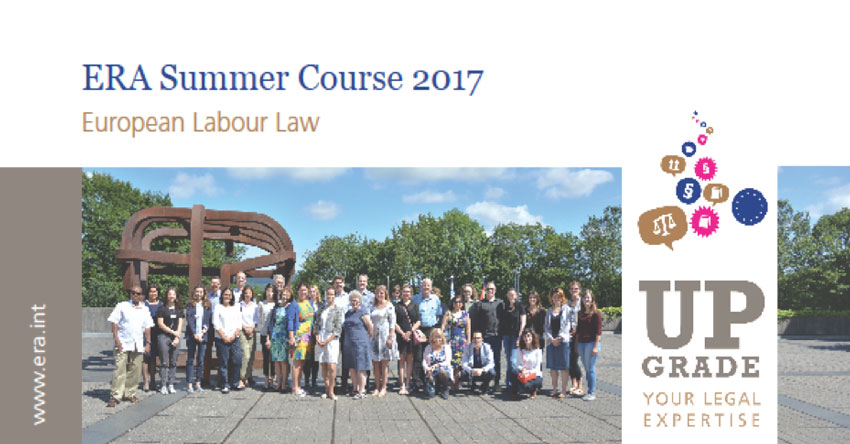
From 2nd to 7th of July 2017 two representatives from The Supreme Court of Cassation in Serbia, Advisors Ms Ljupka Gogić and Ms Zinaida Belić attended Training in European Labor Law, organized by ERA Centre in Trier, Germany.
The Introductory lecture was held by Jean-Philppe Lhernould, a Law Professor at the University of Poitiers on EU Competences, main actors and law making, explaining that EU can adopt legislation only in Treaty Scope, and that there is no overall competence in labor law. Directives lay down minimum standards and countries can guarantee above, but there is no harmonization as such. Content of directives is not directly applicable before domestic courts and one cannot invoke a directive if it is opposite to a domestic rule, but local judge can interpret domestic rule in conformity with the Directive and there is state liability when a breach of EU Law causes damage to an individual.
Dr Claudia Schmidt, a legal secretary in The Latvian Cabinet of the ECJ, held a lecture on Working time, beginning with historic development and International Labor Organization Conventions. It explained legal sources of social policy of the EU whose purpose is to improve working conditions. Furthermore it referred to “on-call duty” cases (working time or rest period?), question of minimum rest period-weekly rest period and paid annual leave (Directive 2003/88/EC).
During CEJ visit in Luxembourg participants had a quick tour through impressive court building and after being introduced with the briefing of the Stollwitzer C -482/16 attended a hearing of the mentioned case. It basically argues whether the new rule in national (Austrian) legislation allowing the exclusion of professional experience acquired before the age of 18 in the sectors that are not in connection with railway business while determining employees grading is not justified and constitutes age and occupational discrimination. The outcome of the case might be interesting for Serbia because it has similar provisions in public sector. Therefore participants are looking forward to the General Advocate Opinion to be delivered on 23rd of November.
Dr Sascha Morgenroth LLM (Austin) Partner followed with the lecture on the transfer of undertakings (Directive 2001/23/EC), explaining purpose of the directive, structure, scope, forms of transfer and consequences of the transfer on the individual level and collective level. This lecture was followed by interesting case-law workshop about transfers of business and rights of employees.
Mr Guy Castegnaro, Advocat, held a lecture on Applicable Law on employment contracts, explaining advantages of regulation instead of directive.
Participants have found ERA Training on European Labor Law to be of immense importance for Serbian judiciary in the sense of understanding EU law and ECJ case-law. As they stated in the evaluation sheet-the goal of gaining new knowledge and exchanging experience with law professionals from other countries was fully reached.